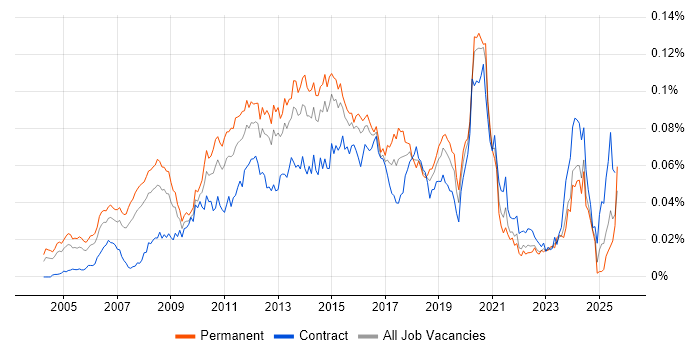Java Solution Architect
UK
The median Java Solution Architect salary in the UK is £135,000 per year, according to job vacancies posted during the 6 months leading to 21 September 2025.
The table below provides salary benchmarking and summary statistics, comparing them to the same period in the previous two years.
| 6 months to 21 Sep 2025 |
Same period 2024 | Same period 2023 | |
|---|---|---|---|
| Rank | 657 | 745 | 753 |
| Rank change year-on-year | +88 | +8 | +426 |
| Permanent jobs requiring a Java Solutions Architect | 6 | 51 | 13 |
| As % of all permanent jobs advertised in the UK | 0.012% | 0.066% | 0.022% |
| As % of the Job Titles category | 0.014% | 0.069% | 0.023% |
| Number of salaries quoted | 3 | 51 | 12 |
| 10th Percentile | - | £97,500 | - |
| 25th Percentile | £132,500 | £127,500 | £97,500 |
| Median annual salary (50th Percentile) | £135,000 | £135,000 | £105,000 |
| Median % change year-on-year | - | +28.57% | +9.09% |
| 75th Percentile | £137,500 | £165,000 | £120,313 |
| 90th Percentile | - | - | £125,000 |
| UK excluding London median annual salary | - | £92,500 | £95,000 |
| % change year-on-year | - | -2.63% | - |
All Permanent IT Job Vacancies
UK
For comparison with the information above, the following table provides summary statistics for all permanent IT job vacancies. Most job vacancies include a discernible job title that can be normalized. As such, the figures in the second row provide an indication of the number of permanent jobs in our overall sample.
| Permanent vacancies in the UK with a recognized job title | 44,024 | 73,822 | 56,894 |
| % of permanent jobs with a recognized job title | 89.63% | 95.26% | 94.37% |
| Number of salaries quoted | 25,875 | 44,135 | 44,212 |
| 10th Percentile | £28,250 | £30,000 | £32,500 |
| 25th Percentile | £36,250 | £40,000 | £43,750 |
| Median annual salary (50th Percentile) | £55,000 | £55,000 | £60,000 |
| Median % change year-on-year | - | -8.33% | - |
| 75th Percentile | £75,000 | £73,750 | £80,000 |
| 90th Percentile | £95,000 | £92,500 | £97,500 |
| UK excluding London median annual salary | £47,500 | £50,000 | £52,500 |
| % change year-on-year | -5.00% | -4.76% | - |
Java Solutions Architect
Job Vacancy Trend
Job postings that featured Java Solutions Architect in the job title as a proportion of all IT jobs advertised.

Java Solutions Architect
Salary Trend
Salary distribution trend for Java Solutions Architect job vacancies in the UK.

Java Solutions Architect
Top 6 Job Locations
The table below looks at the demand and provides a guide to the median salaries quoted in IT jobs citing Java Solutions Architect within the UK over the 6 months to 21 September 2025. The 'Rank Change' column provides an indication of the change in demand within each location based on the same 6 month period last year.
| Location | Rank Change on Same Period Last Year |
Matching Permanent IT Job Ads |
Median Salary Past 6 Months |
Median Salary % Change on Same Period Last Year |
Live Jobs |
|---|---|---|---|---|---|
| England | +65 | 6 | £135,000 | - | 2 |
| London | +36 | 5 | £135,000 | - | 2 |
| Work from Home | +33 | 2 | - | - | |
| UK excluding London | +97 | 1 | - | - | 1 |
| North of England | - | 1 | - | - | |
| North West | - | 1 | - | - |
Java Solutions Architect Skill Set
Top 30 Co-occurring Skills and Capabilities
For the 6 months to 21 September 2025, Java Solutions Architect job roles required the following skills and capabilities in order of popularity. The figures indicate the absolute number co-occurrences and as a proportion of all permanent job ads featuring Java Solutions Architect in the job title.
|
|
Java Solutions Architect Skill Set
Co-occurring Skills and Capabilities by Category
The follow tables expand on the table above by listing co-occurrences grouped by category. The same employment type, locality and period is covered with up to 20 co-occurrences shown in each of the following categories:
